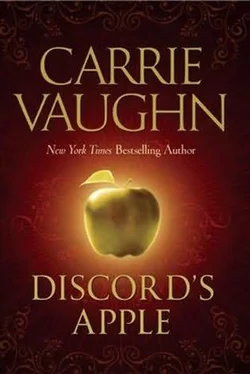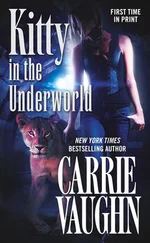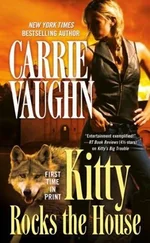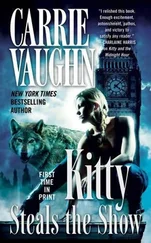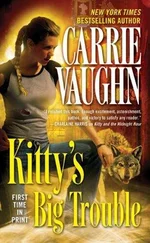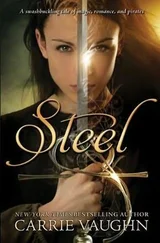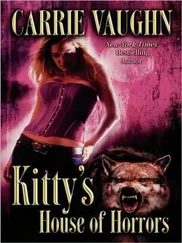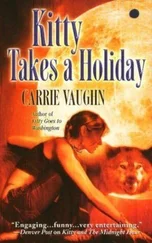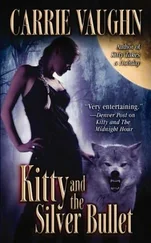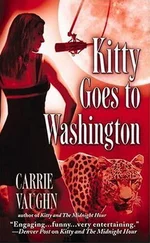He was carrying on, and she barely comprehended what he was saying. He spoke like an authority on the subject. Magicians, magic—those words didn’t mean anything to her. Magic happened in stories, or onstage in Vegas. Not in her family’s backyard.
Except she’d seen it, and she believed. “Real magic?”
He sat back, a distant smile fading on his lips. “I once saw a woman turn to water. She spilled right out of my arms and flowed away. There used to be sirens whose voices lured sailors to their deaths. I saw a bag that, no matter how much you put into it, would always hold more. I’ve seen men who couldn’t be killed.” His voice was haunting, melodious, drawing her into his trance. “Throughout all of history there have been people who could work miracles: saints, mystics, wizards, prophets. And gods. The world used to be filled with gods. Really, they were just people wielding very great magic. The rest of the world couldn’t help but worship them.”
The dozens of books of folklore on the shelves expanded in Evie’s mind, and the world suddenly became a darker, fiercer place. She’d dreamed of being in stories when she was young. She’d made stories her life, writing comic books. But did she really want to live in those worlds?
What was she supposed to do, stay here for the rest of her life looking after the Storeroom? Didn’t she have a choice?
When her father called to tell her he was sick, she didn’t have to come back. She could have stayed in L.A. and checked up on him over the phone. He had plenty of friends here; he didn’t need her. But he was family. It’s what you did. It’s what it all came down to.
She was tied to this place, even as her world fell apart around her. Discord everywhere.
“What does it mean,” she said, “if Merlin’s come here for Excalibur? If he says he’s going to bring him —the one who can pull it from the stone.” Arthur, a voice in her hindbrain said. Say it. “What does it mean if—Arthur—is returning?” When Britain has need of its King again . . .
After the Norman invasion, the Wars of the Roses, Cromwell, Napoléon and the Blitz, how bad would things have to get to bring about the return of Arthur? How bad were they already?
Alex tapped the neck of the bottle against his chin and stared into space. “I wonder if Excalibur could kill me.”
She huffed a frustrated breath and thought of flinging her bottle at him, but it was still half-full, and she didn’t feel nearly tipsy enough yet. This would be easier to take if she were tipsy. Him wanting to die didn’t make any more sense than the rest of it. He was young, in his thirties, strong and intelligent. Not sick like her father. That was what made the situation so horrible—she could almost understand Frank’s wanting to die, wanting to be done with it as quickly as possible without resorting to suicide. It was only her selfishness that wanted him to continue living, no matter what treatment was required, what sacrifices he’d have to make. But Alex—anyone else would relish the invincibility he claimed he had. She supposed that depended on what curses went along with it.
It wasn’t fair that someone who wanted to die should be invincible, while her father was in the next room dying by inches. It wasn’t fair.
Thoughtful, she straightened, considering. “Why do you want to die?”
“It’s the only thing left. I’m tired of living.”
She wished she’d met him at another time or place, at a bar in L.A. or one of the parties her creative friends were always throwing. She could imagine him as an actor—if he’d get rid of the bulky pea coat and put on a tight T-shirt. He carried himself like he was well built inside his clothing. She wondered if that gleam in his eye would carry onto film. He held her gaze, and her stomach lurched. If she’d met him under normal circumstances, she might actually have liked him.
Maybe she already did. When he said he wanted to die, she wanted to argue with him.
She said, “Who are you? Don’t dodge this time.”
He stared at her for a long time, and she was content to watch him think in silence. Then he stood and went to the bookshelves. After a moment of searching, he chose a volume and handed it to her.
Virgil’s Aeneid. Pausing to give Mab a scratch behind her ears on the way out, he left the room without a word. The kitchen door opened and closed, and Evie and Mab were alone.
______
What about that apple.
Robin huddled on the windowsill outside the living room of the Walker house, tiny and invisible. He had the means to evade the watchdog—he could have run the beast on a merry chase if he’d wanted, but that would only have served to raise suspicions that something was amiss. And he still wouldn’t have been able to get inside the house. He didn’t know how that slave fellow had managed it, except that he’d somehow befriended the girl. As Robin would have done, if he hadn’t interfered.
Never mind. He had news, which was what he’d come spying for. Frank was sick, perhaps even dying. And the Walkers had the apple. If only he could find a chink in the house’s armor. Break through and hold them all in his power.
When he tried to slip under the window or through the crack between the door and the frame, he came against a wall, invisible, impenetrable. On bird’s wings, he circled the house three times, skittered to the eaves and over the roof, searching out ventilation slots and testing the chimney. The house had a barrier, a magical shield that guarded the threshold against any who were not welcomed inside. He might have been able to dig under it, but then simple concrete would keep him out.
The easiest way to get inside would be to convince one of the Walkers to invite him in. Otherwise, the shield would have to be dismantled. He tried attacking it, slashing a magicked dagger across the enchantment like he might cut through it. He tried to slide under it, to find an edge that he could squeak around. But the protection was complete.
It didn’t lash out at him. Passive only, it merely kept him out. It didn’t drive him away. He could stay perched on the windowsill all night if he wanted, and the dog wouldn’t even find him. But he’d accomplish nothing that way.
The house belonged to the Walkers. If the magic was tied to them somehow, and not to the house itself, perhaps if they were got rid of . . . Perhaps then the house would open itself like a blossom to the bee.
On his final circuit, Robin paused to look at Excalibur, driven into the stone. It shone, bright silver against dull granite, winking along the few inches of exposed blade, though the sky was overcast. He’d arrived just in time to see Merlin stalk off in a huff. Robin barely had time to make himself like air and was lucky the old wizard hadn’t caught a whiff of his magic. Not many in this modern day would recognize Robin, but Merlin would. Merlin most likely wouldn’t be pleased to find Robin hanging about, known troublemaker that he was.
That was also a bit of news. Merlin was active again, after all these centuries, and the sword Excalibur was waiting to be claimed. Other forces were at play, beside those Hera was dabbling in. And Robin—shrewd Robin, knavish Robin—must ensure he found himself on the winning side when the dust settled.
Robin stayed until the Greek slave left the Walker house. He followed the man into town, treading soft as thistledown, quiet as midnight. His powers hadn’t diminished over the years, but he’d so seldom had a chance to use them for good purpose. He hadn’t found a cause to serve or a great power to attach himself to in centuries, since back in the Old Country. Then she found him. She was ambitious. She had use for him. And she made such grand promises. It hardly mattered if she could keep them or not. The ride would be entertaining in the meantime.
Читать дальше
